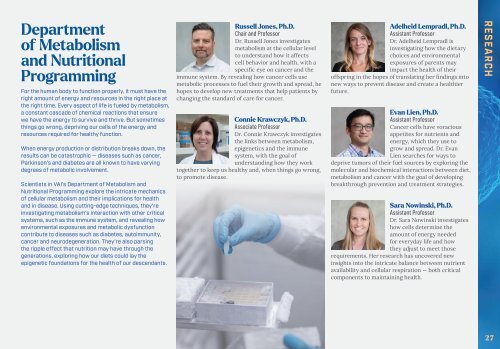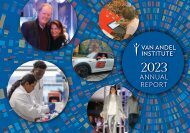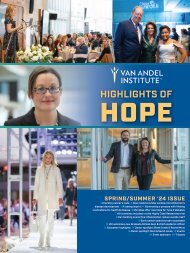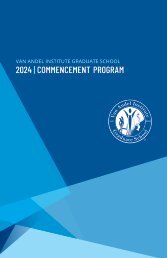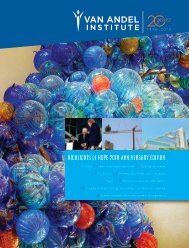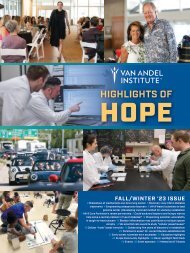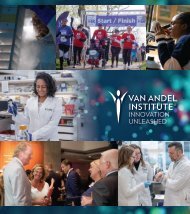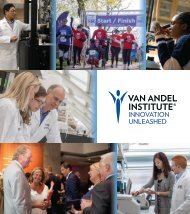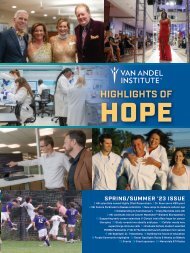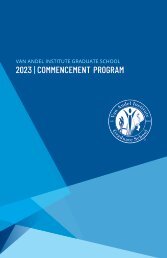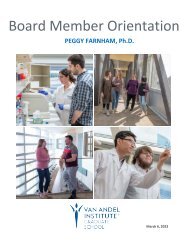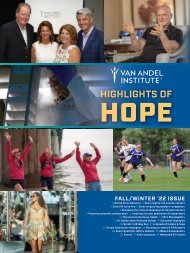2022 Annual Report
This is the 2022 Annual Report for Van Andel Institute.
This is the 2022 Annual Report for Van Andel Institute.
Create successful ePaper yourself
Turn your PDF publications into a flip-book with our unique Google optimized e-Paper software.
Department<br />
of Metabolism<br />
and Nutritional<br />
Programming<br />
For the human body to function properly, it must have the<br />
right amount of energy and resources in the right place at<br />
the right time. Every aspect of life is fueled by metabolism,<br />
a constant cascade of chemical reactions that ensure<br />
we have the energy to survive and thrive. But sometimes<br />
things go wrong, depriving our cells of the energy and<br />
resources required for healthy function.<br />
When energy production or distribution breaks down, the<br />
results can be catastrophic — diseases such as cancer,<br />
Parkinson’s and diabetes are all known to have varying<br />
degrees of metabolic involvement.<br />
Scientists in VAI’s Department of Metabolism and<br />
Nutritional Programming explore the intricate mechanics<br />
of cellular metabolism and their implications for health<br />
and in disease. Using cutting-edge techniques, they’re<br />
investigating metabolism’s interaction with other critical<br />
systems, such as the immune system, and revealing how<br />
environmental exposures and metabolic dysfunction<br />
contribute to diseases such as diabetes, autoimmunity,<br />
cancer and neurodegeneration. They’re also parsing<br />
the ripple effect that nutrition may have through the<br />
generations, exploring how our diets could lay the<br />
epigenetic foundations for the health of our descendants.<br />
Russell Jones, Ph.D.<br />
Chair and Professor<br />
Dr. Russell Jones investigates<br />
metabolism at the cellular level<br />
to understand how it affects<br />
cell behavior and health, with a<br />
specific eye on cancer and the<br />
immune system. By revealing how cancer cells use<br />
metabolic processes to fuel their growth and spread, he<br />
hopes to develop new treatments that help patients by<br />
changing the standard of care for cancer.<br />
Connie Krawczyk, Ph.D.<br />
Associate Professor<br />
Dr. Connie Krawczyk investigates<br />
the links between metabolism,<br />
epigenetics and the immune<br />
system, with the goal of<br />
understanding how they work<br />
together to keep us healthy and, when things go wrong,<br />
to promote disease.<br />
Adelheid Lempradl, Ph.D.<br />
Assistant Professor<br />
Dr. Adelheid Lempradl is<br />
investigating how the dietary<br />
choices and environmental<br />
exposures of parents may<br />
impact the health of their<br />
offspring in the hopes of translating her findings into<br />
new ways to prevent disease and create a healthier<br />
future.<br />
Evan Lien, Ph.D.<br />
Assistant Professor<br />
Cancer cells have voracious<br />
appetites for nutrients and<br />
energy, which they use to<br />
grow and spread. Dr. Evan<br />
Lien searches for ways to<br />
deprive tumors of their fuel sources by exploring the<br />
molecular and biochemical interactions between diet,<br />
metabolism and cancer with the goal of developing<br />
breakthrough prevention and treatment strategies.<br />
Sara Nowinski, Ph.D.<br />
Assistant Professor<br />
Dr. Sara Nowinski investigates<br />
how cells determine the<br />
amount of energy needed<br />
for everyday life and how<br />
they adjust to meet those<br />
requirements. Her research has uncovered new<br />
insights into the intricate balance between nutrient<br />
availability and cellular respiration — both critical<br />
components to maintaining health.<br />
RESEARCH<br />
27


